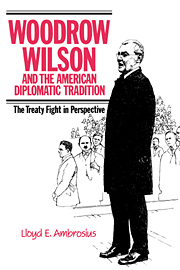Book contents
- Frontmatter
- Contents
- Preface
- Acknowledgments
- List of abbreviations
- 1 Introduction: Wilson's new world
- 2 Origins of Wilson's league of nations idea
- 3 Drafting of the League of Nations Covenant
- 4 American criticism of Wilson's peacemaking
- 5 Revision of the League of Nations Covenant
- 6 The question of control at home and abroad
- 7 The Versailles Treaty in the Senate
- 8 American rejection of the Versailles peace
- 9 The aftermath of Wilson's peacemaking
- 10 Epilogue: Wilson's legacy
- Bibliography
- Index
8 - American rejection of the Versailles peace
Published online by Cambridge University Press: 18 September 2009
- Frontmatter
- Contents
- Preface
- Acknowledgments
- List of abbreviations
- 1 Introduction: Wilson's new world
- 2 Origins of Wilson's league of nations idea
- 3 Drafting of the League of Nations Covenant
- 4 American criticism of Wilson's peacemaking
- 5 Revision of the League of Nations Covenant
- 6 The question of control at home and abroad
- 7 The Versailles Treaty in the Senate
- 8 American rejection of the Versailles peace
- 9 The aftermath of Wilson's peacemaking
- 10 Epilogue: Wilson's legacy
- Bibliography
- Index
Summary
Wilson's intransigence forestalled any compromise between Democratic and Republican senators, thereby preventing them from approving the Versailles Treaty. His all-or-nothing stance resulted in American rejection of the League and failure of the French security treaty. In the spring of 1920, the Senate again refused to accept the peace treaty. Lodge's Republican majority persisted in demanding reservations which Wilson opposed. This executive-legislative stalemate contributed to estrangement between the United States and the Allies. Clinging to his ideal of the League, the president sacrificed real possibilities for constructive involvement in the postwar world, including the Anglo-American alliance with France. Unable to establish his new order, he retreated from active American participation in Europe. He denounced the Allies as he abandoned them. Wilson's isolationist reaction expressed the reverse side of his internationalism, for he had consistently endeavored to redeem or avoid the Old World. He chose to forsake the League, except as an ideal, rather than acquiesce in the Lodge reservations. Vainly pursuing his dream of collective security, he refused to adjust to the realities of interdependence and pluralism. This serious failure led to the final American rejection of the Versailles peace.
Wilson sacrificed the French security treaty to the League, obviously preferring Article 10's universal, but vague, commitment. After belatedly submitting the bilateral treaty to the Senate in late July 1919, he had ignored it. Throughout his western tour Wilson never mentioned this treaty.
- Type
- Chapter
- Information
- Woodrow Wilson and the American Diplomatic TraditionThe Treaty Fight in Perspective, pp. 211 - 250Publisher: Cambridge University PressPrint publication year: 1987



